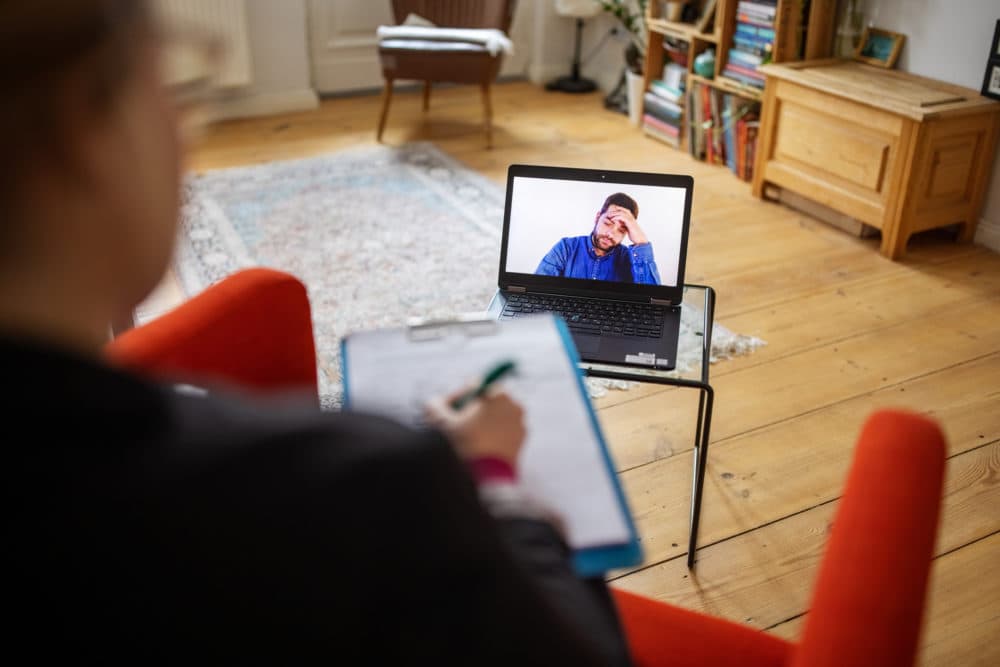Advertisement
'Critical' Need For Mental Health Counselors Grows As Pandemic Takes A Toll

Many Americans faced obstacles to finding a mental health counselor before the pandemic. Now it's even harder.
There's a shortage of counselors to meet the rising demand to treat conditions like depression and anxiety. Almost a third of therapists are seeing more patients, according to a survey last fall by the American Psychological Association, and many are turning away patients because they're booked up.
Licensed professional counselor Tamara Ferebee of Chester, Virginia, is seeing these challenges firsthand. She's executive director of human services administration at the National Association of Black Counselors.
The need for mental health counselors is “critical,” she says. Going virtual and working with insurance companies has been difficult, she says, and now therapists are juggling skyrocketing patient caseloads.
A full-time counselor sees about 25 patients a week, she says, but many of her colleagues are far exceeding that number.
“We are inundated right now,” she says. “We can't even keep up with the phone calls to the office.”
There were already disproportionately fewer Black counselors before the pandemic, so Ferebee says she and her fellow Black therapists are “feeling the squeeze” as they are flooded with calls and appointment requests.
Many of Ferebee’s patients are struggling with the pandemic transition period, she says. Because so many aspects of our lives have changed, more patients are experiencing anxiety, she says, and marital or family conflicts seem more common than ever.
“I'm having definitely more patients call me [while] they're in the middle of a mental health crisis at that moment,” she says. “I'm having many patients call me and they're actively in panic attacks and experiencing all kinds of issues.”
Beyond immediate concerns, Ferebee says the mental health system in the U.S. needs to be strengthened through additional funding and concentrated efforts. Prevention needs to start before a crisis occurs, she says, and continual treatment needs to be prioritized in the aftermath.
Advertisement
As the anxiety-ridden, stress-inducing pandemic continues, another type of counselor is in high demand: school counselors.
Shiloh Wheeler’s days are jammed packed as one of only two school counselors for 1,700 students in the Thatcher Unified School District in Arizona.
The American School Counselor Association recommends schools have one counselor for every 250 students, but many states do not meet this threshold. In Arizona, for example, on average, there's only one school counselor for every 905 students — the worst ratio in the country.
Wheeler’s job entails “putting out crisis after crisis, fire after fire,” she says.
Her district has facilitated in-person classrooms this school year, while a handful of students still opted into remote learning, she says. Even with in-person classrooms in full swing, she has witnessed increases in uncertainty among students, which leads to elevated stress levels.
“Kids have turned out toward the end of the semester a little more apathetic — not really caring a lot about things that they used to really care about or things that used to be important to them,” she says.
Getting kids motivated for their futures has been a major hurdle as a school counselor, whose work heavily involves helping students chart their course, she says.
When the school district first closed last March, she realized how much she relied on certain in-person cues from students. With video-learning fatigue, many students weren’t interested in jumping on a Zoom call to talk with a counselor about how they were faring, she says.
“It was hard to really get a grasp on how students were doing. Even the students who you thought would be doing well or had lots of support at home, after the first month, were telling me that they were really struggling,” Wheeler says.
School administrators and state leaders can provide support by increasing the amount of counselors in each school, she says, and parents can assist by consistently checking in on their children, even those in older grades. She urges parents to reach out to a school counselor if concerns arise.
“When you're in virtual learning mode, kids will spend a lot of time in their room,” she says. “So it may seem normal, but they may not be OK.”
Ashley Locke produced and edited this interview for broadcast with Tinku Ray. Serena McMahon adapted it for the web.
This segment aired on March 5, 2021.


